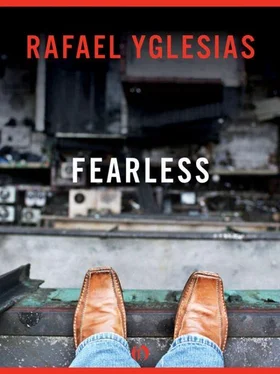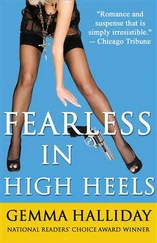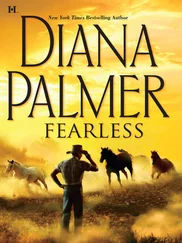“She knows you’re the Good Samaritan,” redheaded Perlman said as they walked to Carla’s apartment. He had grown a beard since their last meeting. It wasn’t as red as the hair on his head, but it was full. Max thought that with his bulk Perlman would make a good Santa Claus. He sounded like one; and in the nearly empty streets the therapist’s deep bass had even more resonance and volume. “It doesn’t impress her, that’s not why she agreed to meet with you. She agreed to meet you because she wants to ask if you saw her child while inside the wreck. I’ve told her no. But she wants to hear it from you. She’s completely obsessed and very — I don’t know — primitive about the whole thing. She’s very Old World, very Catholic, you know?”
“No, I don’t.” Max no longer bothered to guess at the meanings hidden in everyone’s talk. He insisted they be explicit or he would be deaf to their half-speeches.
“I don’t know. She’s filled with guilt and shame. You know?”
“No, I don’t. I’m filled with guilt and shame. How is that Old World?”
“We’re here.” They were in front of two unlocked glass doors, leading to a small tiled vestibule with an intercom and a locked door. “You judge for yourself. I wanted to warn you. She could do anything. They tell me she’s been almost catatonic for weeks. But that could change. She could scream at you. Hit you. Her mother is there and she’ll keep an eye out. Carla doesn’t want me to go up. I’ll be across the street visiting with her priest. He’s actually the one who first called me about her. But we’ve never met, only talked on the phone. Would you ring the bell at that door”—Perlman pointed to a small wooden door in a building next to Saint Patrick’s Old Cathedral—“after you’re done and let me know how it—?”
“Isn’t that where the first black American saint is buried?” Max asked. He gestured at the long wall around an adjoining cemetery. “I was reading about it in yesterday’s Times .”
For a moment Perlman was ready to laugh. He checked that, however, and looked at the top of the wall as though he might be able to vault it with his vision. “I don’t know. I didn’t see the piece. I’ll ask the Monsignor. Give us something to talk about.” He opened the outer glass doors and pointed to the fake gold buttons of the intercom. “It’s three A.”
After he was buzzed in, Max paused in the small area at the foot of the stairs, too cramped a space to be called a lobby. He smelled a kind of cooking and mustiness that reminded him of something. What was it? He waited there until he remembered it was the smell in the halls of his childhood building in Washington Heights. After his father’s heart attack, thanks to the insurance money and his uncle’s help, they had moved to the Upper West Side, which, although it was decayed in those days, was still more definitely middle-class than his old neighborhood. Certainly the buildings smelled different and sounded different. You didn’t know who lived behind most of those doors or what they felt about each other; in Washington Heights he knew what everyone was eating and whether they loved each other. Not that he missed it as a thirteen-year-old. He had preferred the relative bourgeois dignity of the Upper West Side, despite its heroin-addicted muggers and demented rent-control elderly.
Max winced at the fact: his father’s death had improved his life. He was indulged; they lived in a better neighborhood; he was sent to a private school. Max breathed deep of the unventilated odors of ancient garlic and detergents that had worn away the tiles to a smooth rubbed finish and he had to admit it to himself — Dad’s death was boom times for me. He had confessed this to his shrink years ago, but its clarity had been muddied when the good doctor forgave the observation as a generic feeling all sons are liable to. In the vestibule Max looked at the truth, admitting to himself that it belonged to him as an individual characteristic. His shoulder still hurt from his latest struggle with death the month before and he sometimes shuddered at the memory of what he had dared, but the truth stayed with him, that death was his friend, had always been his friend, and now was the source of his strength.
A little old woman, her skin dark and wrinkled, her teeth as white and fake as kitchen Formica, opened the metal door of 3A. She immediately took Max’s enormous goose-down coat — removing it he felt small, as though he had shed a big man’s skin and emerged as a child — and explained that she was Carla’s mother. She said she would take him to the living room and then get Carla.
Max hardly answered; he was surprised by the condition of the apartment. He had expected the dented front door to squeal with age and open into a decrepit interior. But the door opened silently. Judging from the small foyer and the living room, the tenement apartment was maintained in extraordinary condition. The plaster and paint job was immaculate; Max couldn’t see a single bump or crack. The walls were as smooth and pure as if it were eighty years ago and New York was mobbed with meticulous immigrant craftsmen — a Babel of geniuses who worked for what New York’s WASPs considered nothing and the workers considered a fortune. The living room windows, framed by tacky red drapes, were brand-new single Thermopane; but they weren’t sloppily fitted with a slapped-together frame; they had been replastered and set with old-fashioned round-edged sills, each carefully painted so that only the absence of multiple panes made it obvious the windows weren’t original. Also, the wiring seemed to have been redone throughout the apartment, judging from the three-pronged plugs and the recessed lights in the replastered living room ceiling. Either these working-class Italians were secretly rich Mafiosi or the husband had many friends in the trades. Only love or guns could buy this quality of work.
Max was delighted to be in its presence.
“Here we go,” the old woman said, returning to the living room with Carla. The mother seemed half the size of her daughter, although that was partly because she had the beginnings of osteoporosis. The mother may have been small and bowed by age, but she was both guide and engine for her daughter.
“My God,” Max said on seeing Carla as she was steered onto the yellow and white sofa. He was in a matching love seat at its side. “What a tragic face.”
Carla’s mother looked at him, neither upset nor pleased by his comment, but certainly impressed. Carla had no reaction; she stared at him blankly. That surprised him. She had asked to see him and yet she behaved as if his presence were of no concern. She had an El Greco face, elegant and sad. Carla’s black hair twisted away from her in places and fell off in others. The mess was richly colored even though so black — hair with the tints and shine of youth. She reminded him, although her face was different in shape and texture, of his mother when young and widowed.
Here’s your chance to sleep with Mom, Max said to himself without irony.
Max didn’t bother to say hello. “My father died in front of my eyes when I was thirteen years old,” he said into her exquisite and heartbreaking face. Carla’s eyes flickered to life, as if Max had only just appeared in front of her. “I was walking with Mom and Dad and my little sister down a long hill on 174th Street in Washington Heights. I had a brand-new baseball glove, a special first baseman’s mitt that they had spent a fortune to buy me, and I was tossing the ball up and down in the air. I had just thrown it up and was watching it fall toward me when I heard my mother gasp and kind of scream and I didn’t see where the ball fell — somewhere, I guess, it’s still rolling down the street — and I turned and Dad was dead on the sidewalk. There was a little blood coming out of his nose, and his legs were sort of twisted beneath him. My father looked as if somebody, somebody with a big hand, had just reached down, given him one good squeeze and broken the life out of him.”
Читать дальше












